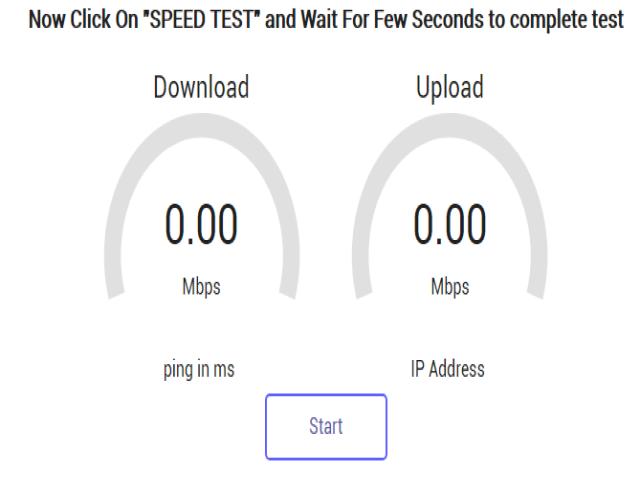Internet Speed test Website

What is Internet Speed and How is Internet Speed Measured? Internet speed refers to the speed which data or content travels from the World Wide Web to your home computer, tablet, or smartphone. The speed of this data is measured in megabits per second (Mbps).One megabit is equal to 1,024 kilobits. This conversion means 1.0 Mbps is more than 1,000 times faster than 1.0 kilobits per second (Kbps). High-speed Internet connection known as broadband (broad bandwidth) is defined by download speeds of at least 768 Kbps and upload speeds of at least 200 Kbps. The difference between download speeds and upload speeds can be explained in the following way: download speed refers to the rate that digital data is transferred from the Internet to your computer, while upload speed is the rate that online data is transferred from your computer to the Internet.
Here the Broadband Internet Speed Test results are given in bits per seconds.
1) 1 Byte = 8 bits
2) Speed test Result / 8 == Your download speed
speed test example :
3.5 MBps(bit) == 3.5 x 1024 Kbps(bit) == 3584 Kbps
3584 kbps/8 == 448 KBPS (Byte)
3) Broadband Internet Speed test Result == Your Broadband band speed plan(In Bit per Seconds)
How Internet Speed Test Works ?
Firstly website will start downloading known sized file. Then it will calculate the time taken for downloading the file. Then it will divide the file size by the time (time taken for download). After that same file will start uploading to server. Then it will calculate the time taken for uploading. After completion of uploading. It will divide the file size by uploading time. You will get downloading and uploading speed of your internet connection (broadband, 2g, 3g, 4g , dsl ).
Speed test Example : known file Size 5mb (5120kb)
- download time = 5 sec
- upload time = 10 sec - downlod speed = File Size/download time = 5120 kb / 5 sec = 1024 kb/sec
- upload speed = File size / upload time = 5120 kb / 10 sec = 512 kb/sec
What Factors Affect Internet Speeds?
There are a number of factors that can affect Internet speeds or your connection to the Internet. The type of Internet connection you are currently using may play a role in Internet speeds. Examples of Internet connections include 3G wireless or 4G wireless, mobile, hotspots, modem or dial-up, broadband, DSL (digital subscriber line), cable, satellite, ISDN (Integrated Services Digital Network), and more.
Additionally, your home computer, laptop, tablet, or smartphone will need to meet the minimum system requirements advised by a high-speed Internet service provider. Internet speeds may vary based on the configuration and performance of computers, hardware, software, applications and other equipment systems. Running multiple devices off the same home network will increase the demand of your home’s Internet system and may affect Internet speeds or Internet connection.
2G max-speed = 1 mbps
3G max-speed = 21.6 mbps
4G max-speed = 100 mbps
broadband 512kbps to 1gbps
all value theoretical

Top Notch And Amazing Driver in UAE
- As a safeguarded driver, you ought to be wary while driving on country roads and ought to be on the

A Review Of The Slots Site SLOTJAGO77
- Is one of the best and most trusted slot game site providers in 2023. This site allows various

Types Of Custom Stickers And Decals
- There are many different types of custom stickers and decals available. It is important to know what

Dos and Don’ts to get Glowing Skin
- Failing to wipe off makeup before hitting the bed can serve as another common cause for pilfering